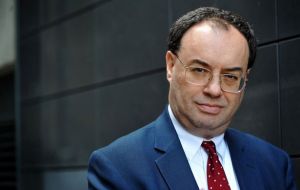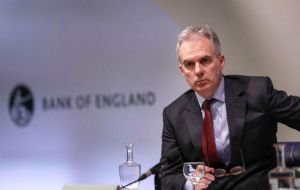MercoPress. South Atlantic News Agency
Bank of England: It's not that bad so the bond-buying program will be scaled down
 BoE bolstered its firepower by a further 100 billion pounds but surprised financial markets by saying it expected the increase to see it through to the end of the year.
BoE bolstered its firepower by a further 100 billion pounds but surprised financial markets by saying it expected the increase to see it through to the end of the year.  “As partial lifting of the measures takes place, we see signs of some activity returning,” Governor Andrew Bailey said
“As partial lifting of the measures takes place, we see signs of some activity returning,” Governor Andrew Bailey said  Deputy Governor Ben Broadbent said BoE estimated that Britain’s economy was heading for a roughly 20% contraction over the first and second quarters of 2020
Deputy Governor Ben Broadbent said BoE estimated that Britain’s economy was heading for a roughly 20% contraction over the first and second quarters of 2020 The Bank of England slowed the pace of its huge bond-buying program on Thursday as it saw some signs that the British economy was recovering from the unprecedented slump caused by the coronavirus lockdown.
The BoE bolstered its firepower by a further 100 billion pounds — as predicted by most economists — but surprised financial markets by saying it expected the increase to see it through to the end of the year.
The central bank said the economy seemed to be contracting less severely than it thought a month ago as the government eases its COVID-19 lockdown, but it was too early talk about the strength of the rebound and it could yet take more action.
“As partial lifting of the measures takes place, we see signs of some activity returning,” Governor Andrew Bailey said. “We don’t want to get too carried away by this. Let’s be clear, we’re still living in very unusual times.”
Deputy Governor Ben Broadbent said the BoE now estimated that Britain’s economy was heading for a roughly 20% contraction over the first and second quarters of 2020, compared with a fall of about 27% included in a scenario it published in May.
The latest round of bond-buying will be spread out over the rest of the year - a third of the BoE’s furious pace of purchases since the crisis escalated in March when it announced a record 200 billion-pound increase in its program.
The sharp reduction in the pace of purchases came as a surprise and British government bond prices dropped.
“We’re slowing from ... warp speed to something that by any historical standards still looks fast,” Bailey said, noting that the U.S. Federal Reserve had also slowed its bond-buying.
The BoE’s chief economist, Andy Haldane, cast a lone vote against the increase. He said Britain’s economy might shrink by only half as much as the BoE set out last month when it warned of the sharpest decline in more than 300 years.
“We expect another 100 billion-pound top-up, but this now looks less certain,” Morgan Stanley economists Jacob Nell and Bruna Skarica wrote to clients.
The BoE kept its key interest rate at 0.1% and there was no discussion of taking it below zero. Bailey said any decision to take borrowing costs into negative territory was not in any way imminent.
The BoE said recent payment data and other up-to-date signals from the economy suggested consumer spending could already have reached a level that it previously expected would only be reached by the third quarter.
But there were risks that a rise in unemployment could be worse than it had thought.
“While recent demand and output data had not been quite as negative as expected, other indicators suggested greater risks around the potential for longer lasting damage to the economy from the pandemic,” the BoE said.
Sterling briefly rose and British government bond yields touched their highest since June 10 after the decision, before easing back a little. The 2-year gilt yield temporarily turned positive for the first time in more than a week.
The BoE says that pumping more stimulus into the economy will help it meet its 2% inflation target. Data on Wednesday showed annual inflation of just 0.5% in May.




Top Comments
Disclaimer & comment rulesCommenting for this story is now closed.
If you have a Facebook account, become a fan and comment on our Facebook Page!